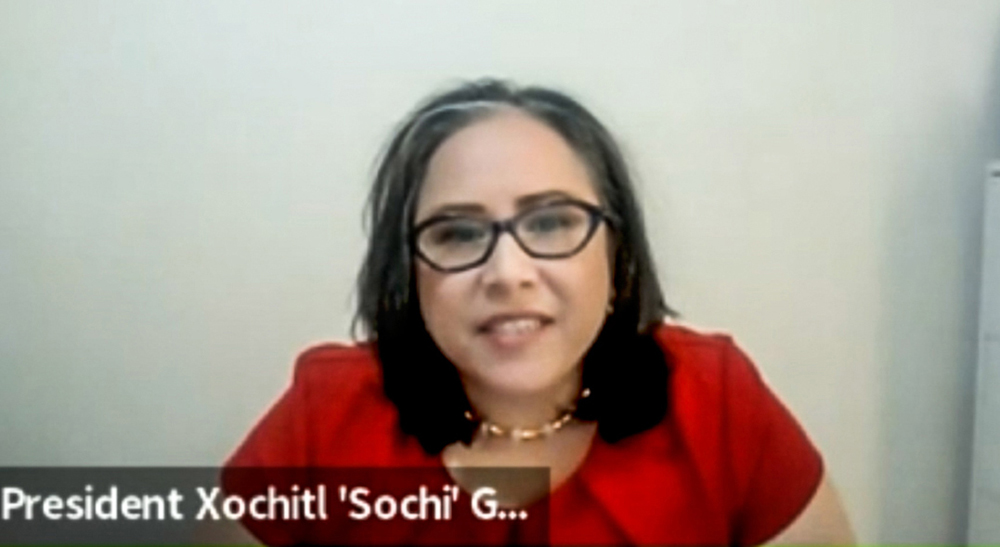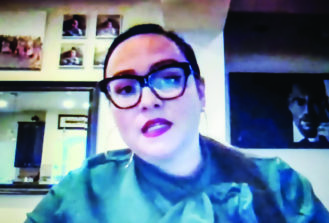
Board President, Xochitl ‘Sochi’ Gaytan, addressed her fellow board members and the viewing public before listening to public comments on March 24.
The Denver school board voted March 24 to implement new restrictions on the way that the district’s innovation schools operate.
The board’s 5-2 vote came after listening for several hours of comment over Zoom from dozens of parents, teachers and school leaders who overwhelming opposed to the proposal known as an Executive Limitation.
Some board members said that there was insufficient community engagement for such a move that has caused much division among school communities. More time is essential to ensure proper practices for innovation schools.
“It’s about doing it right,’’ said Michelle Quattlebaum who represents northeast Denver that has numerous innovation schools. “I don’t have a yes, and I don’t have a no.”
Others said that the board needed to approve the measure and continue to work on innovation school issues. And they won.
“I want to do the work,’’ Brad Laurvick said.
Voting for the measure were Scott Esserman, Laurvick, Scott Balderman, Xochitl “Sochi” Gaytan and Carrie Olson. Voting against it were Tay Anderson and Quattlebaum.
 Prior to Thursday’s meeting the board had proposed to strip several key autonomies from district policies and teacher contract provisions that innovation schools enjoy.
Prior to Thursday’s meeting the board had proposed to strip several key autonomies from district policies and teacher contract provisions that innovation schools enjoy.
That initial proposal was further pared down March 21 to simply take away the ability of innovation school principals to fire ineffective teaches without following the process spelled out in the collective bargaining agreement.
Nevertheless, because of the haste with which the proposal moved its eventual impact is still somewhat difficult to calculate at this point.
Board members have said the change was necessary to protect teacher rights that they believe can be violated by waivers given to innovation schools which are district-run but with autonomy from some policies and portions of the contract. At least 60 percent of union members at a scwwhool must vote in favor of any waivers.
The board’s initial proposal had drawn strong opposition from school leaders, teachers and parents. A recent virtual town hall organized by innovation principals and attended by board members attracted more than 900 people. Many attendees were from northeast Denver, home to 10 innovation schools. DPS has 52 innovation schools.
Kurt Dennis, executive principal of McAuliffe International middle school, says board decisions like this can turn principals from leaders into middle management.
“Coming out of the pandemic, our schools are facing unprecedented challenges,’’ he said. “Our students are behind academically, and they are struggling with their mental health. Our teachers are overwhelmed and exhausted from picking up the slack.

Jen Anderson, Principal at Grant Beacon Middle School, spoke out against the EL at the March 9 meeting.
“It astounds me that when faced with a crisis of this magnitude, the DCTA and the school board have chosen to make their highest priority eliminating school-level autonomies and ensuring that the least effective one percent of teachers keep their jobs.”
The seven-member board all won their seats with the strong backing of the union, known as the Denver Classroom Teachers Association. They have reversed a number of reforms instituted by former superintendents and boards since the mid-2000s.
Like Dennis, parents wonder why this redo of innovation practices has come up. They consider their schools well-run where their children are getting a good education. As far as they know, staffs of their schools are not unhappy.
“Since 60 percent of the school’s unionized teachers have to vote for innovation, isn’t this proposal going against the expressed desire of the supermajority of teachers at those schools?” one meeting participant said.
Another parent said: “They don’t care what parents have to say; the teacher’s union is their priority. Why would we give the board more say over how our far-more-successful innovation schools are being run when they have a horrible track record?”
But some teachers say that they fear for their livelihoods if they don’t have protections against firing without a process that the union contract provides.
“I love that we are going to protect teacher’s rights across the district,” a teacher at McAuliffe, who wished to remain anonymous, said in an interview. “Right now, I don’t have that protection, and it makes me a little worried.
“I am fortunate that Kurt (Dennis) is a great leader, but not everybody who runs an innovation school is a great leader just like not everybody is a great teacher. We just want a more democratized work environment, so when we advocate, we’re not at fear of losing our jobs, our health insurance, our homes.”
Since the board’s plans were not based on student performance issues, many attendees wanted to know where it originated. Apparently, not from teachers. In a statement on his website, board Vice President Tay Anderson said that the process was “flawed and rushed” and that the board “did not have any educators come to us highlighting a concerning pattern of innovation leaders working to erode their rights away from them.” He added, “Our priorities must be centered on student achievement, not adult politics.”
Innovation is not the enemy of teachers’ rights, said Jennifer Anderson, principal at Grant Beacon Middle School.
“I was a DCTA union rep for seven years,’’ she said. “I’m not against the DCTA or educator’s rights. But I am in favor of innovation. These beliefs should not be at odds with one another.
“These limitations ask us to take a step backwards. We cannot tackle the future by what we did in the past.”
Front Porch photos by Christie Gosch



0 Comments